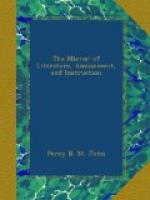* * * * *
NAPOLEON AT FONTAINBLEAU,
As related by De Bausset.
On the evening of April 8, 1814, De Bausset left Blois, commissioned by Josephine to deliver at Paris, a letter to the Emperor of Austria, and afterwards another at Fontainbleau to her husband. Having executed the first part of this commission, he set out at two in the morning of the 11th of April for Fontainbleau, and arrived at the palace about nine o’clock. He was introduced to Napoleon immediately, and gave him the letter from the empress. “Good Louise!” exclaimed Napoleon, after having read it, and then asked numerous questions as to her health and that of his son. De Bausset expressed his wish to carry back an answer to the empress, and Napoleon promised to give him a letter in the afternoon. He was calm and decided; but his tones were milder, and his manners mere gentle than was his wont. He began talking about Elba, and showed to De B. the maps and books of geography which he had been consulting on the subject of his future little empire. “The air is good,” said he, “and the inhabitants well-disposed: I shall not be very ill off there, and I hope Marie-Louise will put up with it as well as I shall.” He knew that for the present they were not to meet, but his hope was that when she was once in the possession of the duchy of Parma, she and his son would be allowed to reside with him in the island. But he never saw either again. The prince of Neufchatel, Berthier, entered the room to demand permission to go to Paris on his private affairs; he would return the next day. After he had left the room, Napoleon said with a melancholy tone:—“Never! he will never return hither!” “What, sire!” replied Maret, who was present, “can that be the farewell of your Berthier?” “Yes! I tell you; he will not return.” He did not. At two o’clock in the afternoon Napoleon sent again for De Bausset. He was walking on the terrace under the gallery of Francis I. He questioned De B. as to all he had seen or heard during the late events; he found great fault with the measure adopted by the council in leaving Paris; the letter to his brother, upon which they acted, had been written under very different circumstances; the presence of Louise at Paris would have prevented the treason and defection of many of his soldiers, and he should still have been at the head of a formidable army, with which he could have forced his enemies to quit France and sign




